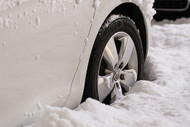How Cold Weather Affects Your Vehicle
30th Dec 2022

Is your vehicle ready for the cold weather? As the temperatures begin to drop, you may notice some changes with your vehicle. Whether you drive a car, truck or SUV, the cold winter weather can affect your vehicle in several ways.
Lower Tire Pressure
You may need to inflate your vehicle's tires a little more in cold weather. Heat, of course, causes things to expand, whereas cold has the opposite effect by causing things to contract. The air inside of your vehicle's tires will contract in cold weather. For every 10-degree drop in temperature, your vehicle's tires may lose about 1 pound of air pressure.
Battery Degradation
Cold weather can have a negative impact on your vehicle's battery. The average lifespan of an automotive battery is about three to four years. Automotive batteries contain chemicals, which they use to store electricity via chemical reactions. Exposure to cold weather, however, can interfere with these chemical reactions. Your vehicle's battery may have a lower charge capacity in cold weather, or it may completely die.
Longer Time to Reach Operating Temperature
It will take your vehicle's engine longer to reach its operating temperature. Operating temperatures for most automotive engines fall somewhere between 195 and 220 degrees. Until your vehicle has reached this temperature, the thermostat will remain closed, meaning coolant won't be able to flow through the engine and radiator. The thermostat will only open after the engine has reached its operating temperature. Regardless, you'll have to wait longer for your vehicle's engine to reach its operating temperature in cold weather.
Body Damage
Depending on where you live, your vehicle may be susceptible to body damage in cold weather. Many regions throughout the United States use road salt to lower the risk of winter accidents on the road. Road salt lowers the freezing point of water while also providing greater traction. But exposure to road salt can take a toll on your vehicle's body.
You can still drive on salt-covered roads, but you should consider washing your vehicle shortly thereafter. Allowing road salt to accumulate on your vehicle will only increase the risk of body damage.
Thicker Fluids
Cold weather will make the fluids in your vehicle thicker. Your vehicle has many different fluids, some of which include engine oil, power steering fluid, brake fluid, coolant and transmission fluid. Aside from the coolant, most of these fluids will become thicker in cold weather. And as they thicken, they'll move more slowly until they've warmed up.

